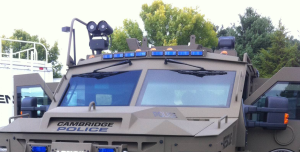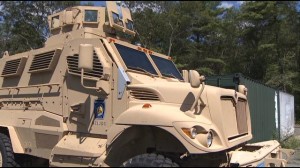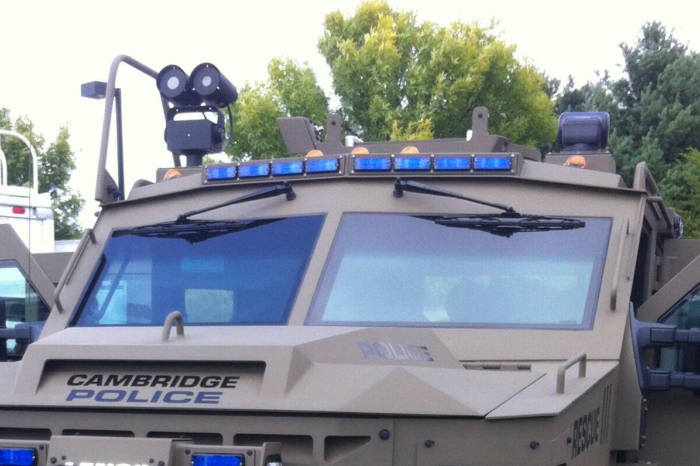Why do Massachusetts police departments have tanks? And more importantly, why are they hiding them?
 Ever since media coverage of the Ferguson protests brought us images of local law enforcement armed with weapons and gear that looked more at home in Fallujah than a suburb of St. Louis, the increased militarization of the police has been a topic of much controversy and debate. However, while the national scrutiny is new, the practice of state and local agencies stockpiling military-grade ordnance – and the Pentagon’s program that makes it possible – has been happening for over a decade.
Ever since media coverage of the Ferguson protests brought us images of local law enforcement armed with weapons and gear that looked more at home in Fallujah than a suburb of St. Louis, the increased militarization of the police has been a topic of much controversy and debate. However, while the national scrutiny is new, the practice of state and local agencies stockpiling military-grade ordnance – and the Pentagon’s program that makes it possible – has been happening for over a decade.
Originally started by the Department of Defense in the mid-to-late nineties, and now handled by the Defense Logistics Agency, the 1033 program, as it is known, makes excess and obsolete military equipment – everything from hand tools to tanks – available to state-level police and sheriff’s departments for little to no cost. It’s easy to see why the program would, from the Pentagon’s perspective, look like a win-win – the military gets to replace their old gear with the latest and greatest, and local law enforcement is better equipped to deal with potential threats, such as a foreign or domestic terrorist attack. But from a personal and practical standpoint, the program quickly falls apart.
With seven golf courses and a population a little over ten thousand, it’s hard to image suburban Rehoboth, Mass getting much use out of its Mine Resistant Vehicle, designed to survive IEDs and now faced with nothing more dangerous than a driving range. Or Springfield employing one of its two grenade launchers. And for Bostonians, who could forget the disquieting sight during the Marathon Bombing manhunt of tanks patrolling the Common?
Rather than addressing need for this kind of equipment, the 1033 program addressed desire – and most law enforcement agencies, given the opportunity to get these kinds of high-tech toys for free, jumped all over it. And the Pentagon, rather than trying to identify which requests had merit, encouraged this “shop ’till you drop attitude,” even awarding “Million-dollar spender” designations to agencies that fully took advantage of what they were offering. As a result, you had five billion dollars worth of weaponry in the hands of people who were eager to use it and only minimally trained in its use. Something was bound to happen eventually, and that eventually was Ferguson.
Shortly after the Ferguson protests started, MuckRock published a list of all equipment that had been transferred to state and local agencies, nation-wide, between 2011 and 2013. Unfortunately, the list only mentioned which state got which equipment, rather than the specific agencies that received them. Through a separate request, we were able to determine a list of all agencies that had participated in the program, but determining who had gotten what was still a matter of investigation and guesswork.
Then, MuckRock’s Special Projects editor came up with the idea of requesting the information from the state police agencies directly, in hopes they had a 1033 coordinator who would have an agency-by-agency equipment list. The hunch proved right on the nose, and the lists came pouring in, detailing exactly which law enforcement agencies got what ordnance. Which is how were able to find that the Los Angles School Police was in possession of a mine resistant vehicle and three grenade launchers, putting Rehoboth and Springfield to shame.
As of writing, we have the agency-by-agency list for 34 states – sadly unsurprising, considering our state’s terrible record on transparency, is that Massachusetts is not one of them. Despite the overwhelming majority of states thinking otherwise, Mass is exempting the information in full as a matter of public safety. MuckRock is currently appealing the decision, but considering the current state of the appeals process in Mass, success is highly unlikely.
Seeing as that we have the complete equipment list, and all they’re withholding is the location of several big-ticket items – including at least one M106 mortar carrier – how safe do you feel knowing that could be in your neighborhood?
J. Patrick Brown is the Editor of Muckrock.com, an organization which facilitates public record requests and serves as an independent news source covering government transparency issues nationwide.



